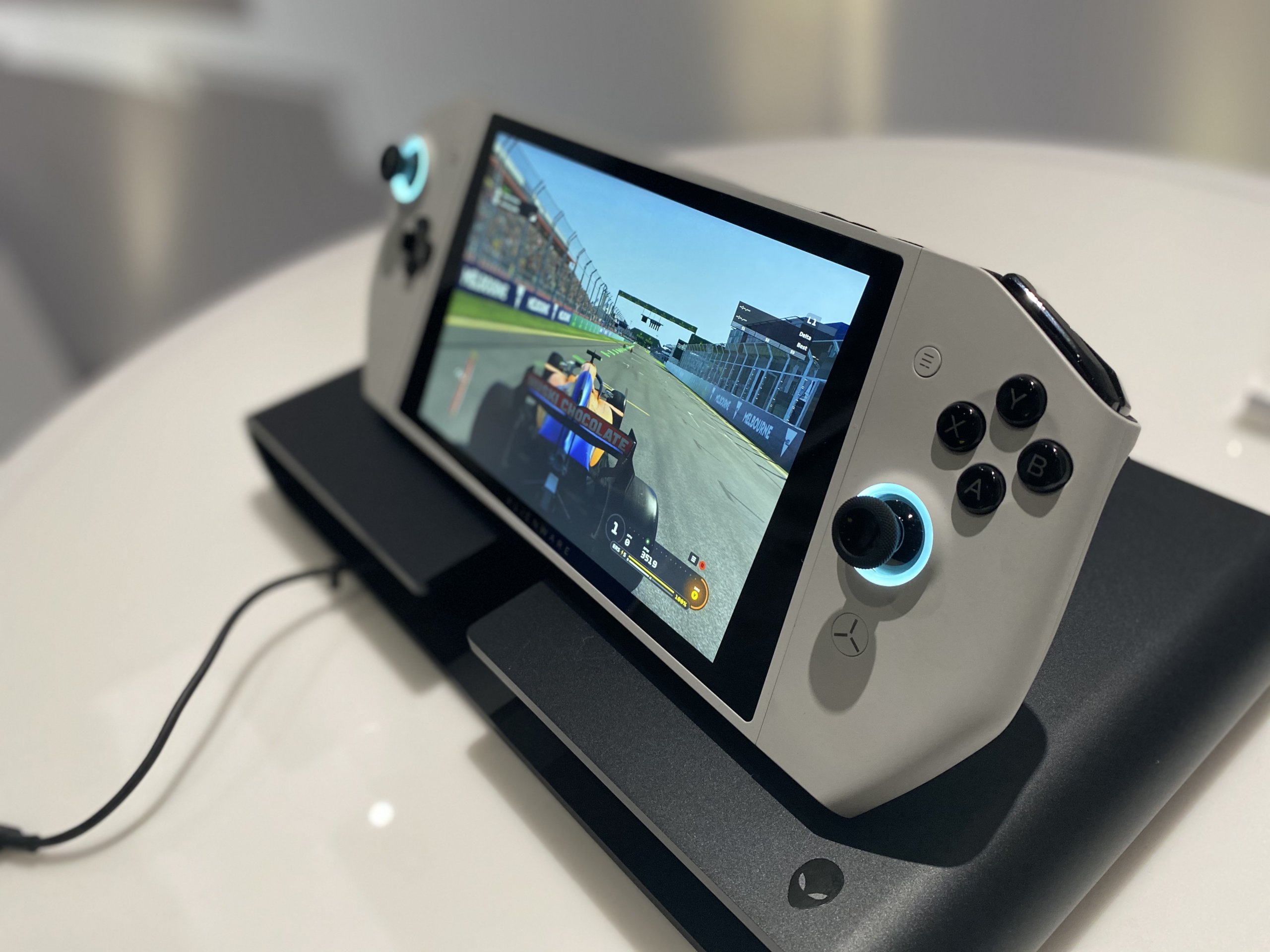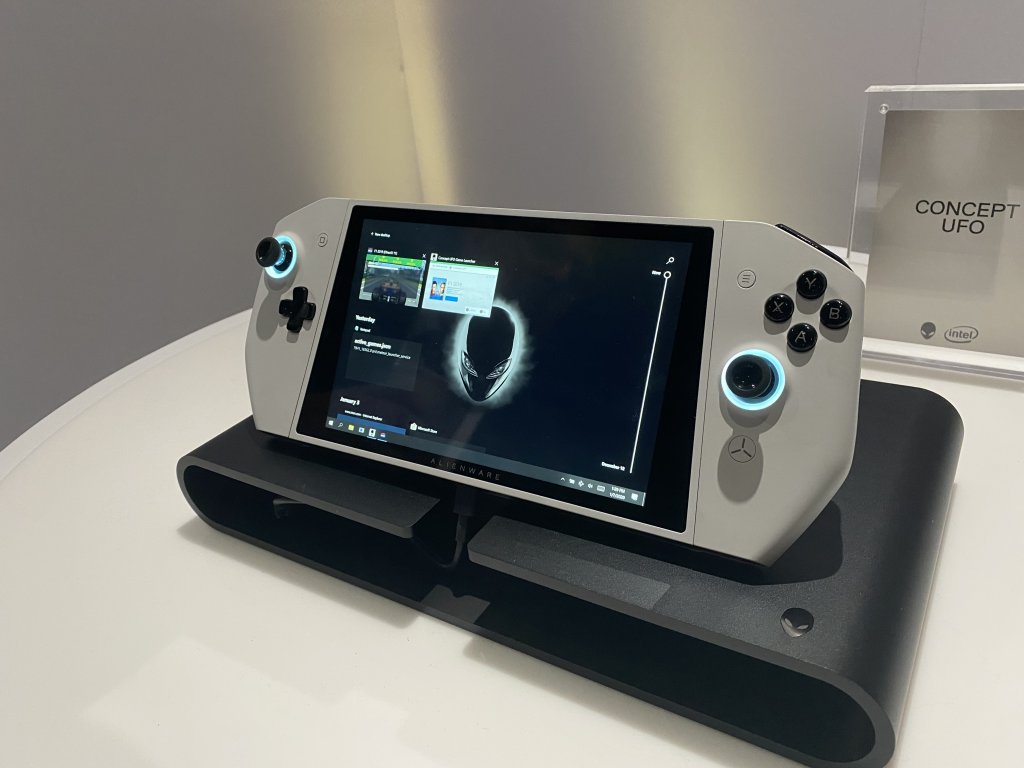
Dell’s gaming brand Alienware brought the big guns to CES this year, doing something it’s never done before: Showing off concept technology. The tech in question? A handheld gaming PC with the code name “Concept UFO.”
When Aisha Tyler showed it off during the Dell Experience Live press conference, a few key questions immediately popped into my mind. Is this a full PC? Does it stream games from your computer, or do the games live on the console itself? What game platforms does it support? Luckily, although Dell didn’t release any specs for the UFO at CES, I was able to answer most of these questions when I got my hands on it in person.
Concept UFO is a full-blown PC
Alienware likely saw the Nintendo Switch and decided to turn it into a meme. More specifically, a meme that says something along the lines of “Your gaming handheld vs. the gaming handheld she told you not to worry about.”
The “console vs. PC” war has been raging in the streets for decades, and this takes it to an entirely new level. When the Nintendo Switch was unveiled, it brought with it innovation the likes of which the console gaming industry hadn’t seen since the original Wii. Alienware’s Concept UFO took that innovation and pumped steroids into it. Gaming PC’s have always been physically better than consoles, in terms of hardware and performance, with the barrier for entry usually being high costs and lack of portability. Dell didn’t say what the UFO costs, but it’s definitely portable.
The UFO is essentially a Switch that’s been souped up to run PC games. At the conference, I was able to play Mortal Kombat 11, a pretty graphically intense game, and it ran smooth and without issue. Also, when I say the UFO is a full PC, I mean it. It has a desktop, and the games I was able to play were all run through Steam, not the Windows Game Store or any Dell-only game market. It had a browser, and although I couldn’t dive very deep, it looked and felt like a fully functional desktop computer.
The UFO isn’t Stadia

One of the larger concerns I had when seeing the first UFO was that it would just be a Google Stadia clone. “Great,” I thought, “Alienware made a fancy controller to stream games on.” That’s not the case, as Dell rep Drew Tosh told me. The games themselves are run and processed by the UFO itself, right there in the hardware. They aren’t streamed over the cloud.
That raised another question, though, because in the presentation, Dell described being able to pause a game on your desktop and resume it on your commute. This implies that streaming capabilities are on the way, similar to how Steam allows you to stream a game from your home desktop onto other PCs. When I asked, however, Tosh told me that he “couldn’t answer that question just yet.”
This further backs up the “UFO as a full PC” argument from Dell. Even if streaming is (or isn’t) on the way, the device is made to support games right then and there, without needing to haul tons of data over a network just to boot something up. Due to Dell not releasing the specs for the UFO just yet, it’s hard to detail how exactly these games can run, but when I played both an F1 racing game and Mortal Kombat, they both ran very smooth, with one exception.
Like a laptop, the UFO is able to be plugged into an external display, even from handheld mode, but the external display at Dell’s booth was extremely choppy and showed visible tearing. I couldn’t confirm if this was an issue with the system, the monitor, or the cable, but when it ran in handheld mode, it was incredibly responsive with no visible problems.
Designed like a premier Nintendo Switch

As the UFO functions much like a beefy Switch, it was also designed like one. When looking at the UFO, you’ll notice some very obvious similarities, albeit much larger.
First, the handheld and tabletop modes. Just like the Switch, there are two detachable controllers that can be plugged into a battery pack to function as one separate controller while your UFO sits on a table or desk with its kickstand (it’s an actual kickstand, too, not like the dinky excuse for one on the Switch). And then, there’s the tried and true handheld mode, which is when the controllers are plugged into the 10-inch display and you can take it on the go.
There surprisingly aren’t many design differences, despite this being marketed as a PC, and Nintendo’s Switch being, well, a Nintendo product. The only two significant design differences I could spot were the UFO’s size and controllers. The size of the entire machine is larger than the Switch, and the controllers feel like full gaming controllers in your hands, similar in feel to an Xbox or PlayStation controller. The other difference is that they magnetize to the display, rather than simply snapping in. That’s mostly it, at least from what I could tell.
Dell has other concept products on the way, including Concept Ori and Concept Duet, which include bending and dual-connected displays.

